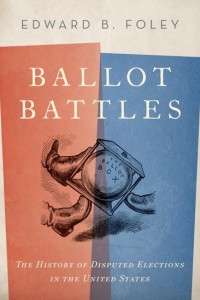The following is the first of five guest posts by Ned Foley of Ohio State, about his new book Ballot Battles: The History of Disputed Elections in the United States:
Thanks, Rick, for the chance to highlight some themes from Ballot Battles: The History of Disputed Elections in the United States (Oxford University Press, 2016).
Theme One: The disputed presidential elections of 1876 and 2000 were not isolated, aberrational events in America’s political system. Instead, they are merely the two most prominent peaks in an entire range of disputed elections running through American history from the Founding Era to the present. Like geologists who can detect the plate tectonics that underlie a mountain range, we can employ the historian’s tools to see the structural forces that underlie the pattern of vote-counting disputes that have erupted periodically in the past.
America’s difficulties in employing fair and predictable procedures to count ballots in close elections are rooted in beliefs held—and choices made—at the time of Founding. The Founders, as we know, abhorred political parties and they hoped to design a constitutional system that, by using separation of powers, would keep factionalism from developing into organized political parties. Well, we know the plan did not work out as intended.
But what is less well understood is that this misjudgment had specific consequences in the context of a disputed statewide election, like that for governor or a state’s presidential electors. The head-to-head electoral competition between two organized political parties has particular ferocity in a statewide ballot-counting fight. But the Founders did not anticipate this particular problem, and thus did not provide an institution to handle it. They knew about vote-counting disputes in district-based elections for legislative seats, but those were relatively contained affairs that could be handled within the confines of each legislative chamber. It was an altogether different thing when partisan control of the government’s chief executive turned on the counting of a relatively few contested ballots. Before the Revolution, America had no experience with that: colonial governors were appointed, and the hereditary Monarch was hardly an elective office.
The Founders soon suffered from their oversight. One of important early episodes in New York’s 1792 election for governor, when John Jay was running as a Federalist to defeat the incumbent George Clinton, the leader of the Jeffersonian party (the “Democratic Republicans”) in the state. In addition to Jay himself, as well as Jefferson watching from afar, other leading Founders—including Alexander Hamilton and James Madison—either participated in or commented upon the vote-counting controversy that erupted in this election. It was an altogether new development that they were unprepared for, both intellectually and institutionally. But it was not the only surprise of its type. In 1806, Massachusetts also suffered a disputed gubernatorial election that seriously threatened civil strife in the state in the same way that New York’s crisis a decade earlier had.
Don’t just take my word that the Founders were caught by surprise. They said so themselves. Consider Madison, the foremost father of the federal Constitution. In the 1820s, long after the Convention in Philadelphia and after he himself had served as president, he admitted that the system for presidential elections adopted in 1787 had been a mistake. A topic addressed “in the latter stage of the Session,” Madison wrote to a correspondent, “it was not exempt from a degree of the hurrying influence produced by fatigue and impatience of all such Bodies.” In particular, by the 1820s, having seen what had happened in New York and Massachusetts and the like during the first few decades of the Republic, Madison was concerned that the Constitution left the nascent nation vulnerable to the calamity of a vote-counting dispute in a presidential election. “In arranging the delicate task of appointing a President,” Madison wrote in an 1826 letter, “as little room as possible ought to be left for abortive or controvertible results.”
But the nation didn’t, and still hasn’t, heeded Madison’s warning.
